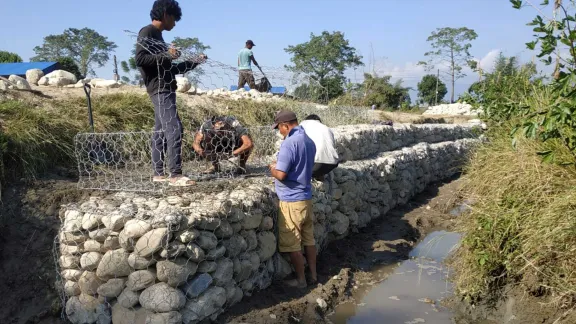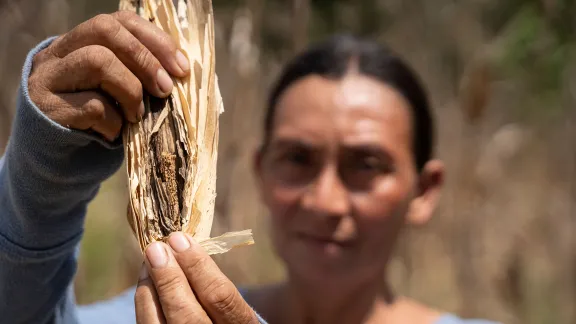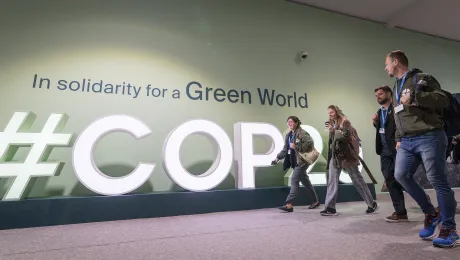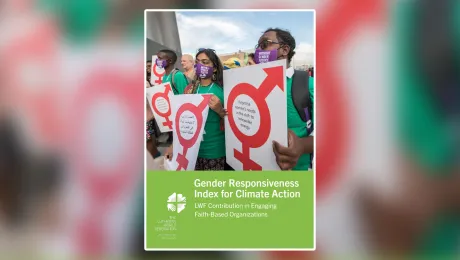
Communities learn how to build defenses against river flooding in Nepal. Photo: LWF Nepal
LWF projects in Nepal and Central America provide insights into prevention, resilience and community preparedness
(LWI) - The Lutheran World Federation (LWF) and four partner members of ACT Alliance launched a new report on 17 October outlining opportunities for closer cooperation and strengthening good practices for responding to climate change-related loss and damage. During the presentation of the report, its authors highlighted “the unique opportunity of faith-based organizations to connect local and global actors and to leverage community trust” which is vital for effective and sustainable action.
The report is based on research into 74 climate-related humanitarian and development projects in Africa, Asia and Latin America presented by LWF, ACT Church of Sweden, Dan Church Aid, Finn Church Aid and the Finnish Evangelical Lutheran Mission (Felm). Six of those projects were selected for in-depth analysis to glean valuable insights into the practical implementation of activities that have prevented, minimized or significantly addressed loss and damage by working with local communities.
Two of those projects were implemented by LWF in Nepal and in Central America, namely a 2019-2023 Transboundary Flood Resilience project, funded by the Evangelical Lutheran Church in America, which focused on strengthening flood resilience by improving disaster risk management, community preparedness and promoting cross-border knowledge sharing in Nepal and Bangladesh, as well as a Microinsurance and Climate Resilience Building project in El Salvador.
Transboundary flood resilience in Nepal
Speaking at the launch, Dr. Bijaya Bajracharya, Country Director for LWF Nepal noted that her country is among the top ten countries most affected by climate change. “The economy is particularly vulnerable to shocks affecting the agricultural sector,” she said, with “the majority of the population dependent on small-scale farming for their livelihoods.” As a result of the heavy flooding in September this year, she added, “Nepal lost paddy, livestock and fishery amounting to 223 million U.S dollars.”

Crop damage to maize in El Salvador caused by climate change. Photo: LWF El Salvador
Responding to loss and damage is essential as Nepal struggles with both the immediate and long-term impact of more frequent and extreme weather events, Bajracharya continued. She noted that projects must be community-driven and flexible to adapt to changing needs, and that disaster preparedness training for communities should be aligned with options for diversifying their livelihoods to ensure long term economic stability.
Microinsurance in El Salvador
In Central America, small farmers in the so-called Dry Corridor are also severely impacted by extreme climate-related events. Forecasts show that rising temperatures are expected to reduce agricultural production there by up to 50 percent over the next four decades.
Since 2015, LWF’s Central America program has been working with local farmers and other partners in the region to organize discussion groups leading to the establishment of a microinsurance project to help build community resistance and support those most affected by droughts and flooding. Since 2021 a total of 723 farmers, women and men, have received subsidies and access to an index-based insurance, as well as tools to build their resilience to their rapidly changing environment.
LWF Program Executive for Climate Justice Elena Cedillo said the report “reinforces the importance of advocating for loss and damage responses based on gender-inclusive and human rights-based approaches. It highlights the importance of faith-based actors in both prevention and recovery from the impacts of climate change. The report offers potential insights for shaping existing policies and frameworks for financing and responding to loss and damage.”


